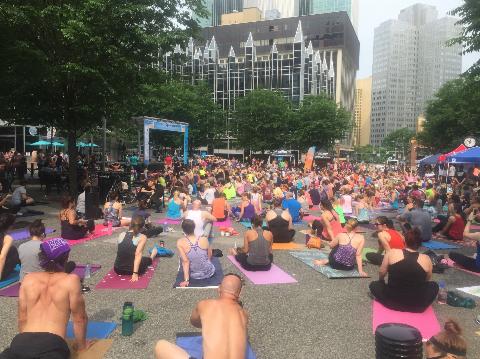Sunday morning, the streets of Pittsburgh were bustling with everything but cars. Bicyclists, unicyclists, dog walkers, runners, rollerbladers, musicians, monks and hula hoopers alike roamed the temporarily car-free streets of Pittsburgh for OpenStreetsPGH.
OpenStreetsPGH kicked off its first event this year May 29, running from 9 a.m. to 1 p.m. BikePGH organized and sponsored the event with the help of outside organizations, including Highmark Health and the Colcom Foundation.
Free and open to the public, the event consisted of 3.5 miles of closed-off road from Downtown to Lawrenceville.
“OpenStreetsPGH is this idea to take a couple of miles of road in Pittsburgh and let people walk, ride their bikes, run, rollerblade — just to let them use the streets without fear of cars or getting hit,” said Suzanne Wasilko, a business intern with BikePGH.
But beyond the freedom of the streets, Scott Bricker, Executive Director of BikePGH, said that the purpose of the event is to have people out getting healthy exercise, shopping at local businesses and exploring the city in a new way.
“Primarily, along the 3.5 miles of course, it’s mostly walking, biking, running and skating, but we also have [public activities],” Bricker said. “For example, at Market Square, there is Zumba and yoga. There are also some workout classes up the course — boot camp, salsa dancing — anything that gets people moving.”
There were stations along the course where children drew with chalk on sidewalks, jumped rope, played baseball and did many other activities. Although there were no cars, the streets were constantly in motion, from bike riders to mothers pushing strollers.
Mike Carroll, the Event Director of BikePGH, said that OpenStreetsPGH is not a new concept and has been around for about 40 years, the idea originating in Bogota, Columbia.
“In Bogota, they do this initiative where they close down streets to car traffic because they are facing the same issues that we have here in the United States: childhood obesity and chronic health problems among their citizens.”
The movement in Bogota is called Ciclovía and is now practiced in over 100 cities in North and Central America. Bogota closes its roads every Sunday and holiday to bring the parks to the people, and the initiative has expanded to about 100 miles of car-free streets and over 1 million participants.
2016 is the second year of OpenStreetsPGH and features three event days throughout the summer: the last Sunday of May, June and July.
“The June version is going to be essentially the same [as this OpenStreetsPGH event],” Bricker said. “There’s going to be one detour because it’s also [the Pittsburgh Jazz Live International Festival], but it will still be Downtown to Lawrenceville.”
Bricker said July’s route changes to a Downtown course that travels to the West End via the North Side. OpenStreetsPGH hopes to do at least one new route a year.
Last year’s event had a turnout of nearly 18,000 people, but Carroll commented it’s too early to tell what the head count is for this year.
In a grassroots effort, partnership between over a dozen organizations and many volunteers made OpenStreetsPGH possible. But while the freedom of the event is its main selling point, the lack of a central activity makes the event difficult to illustrate.
“Our biggest challenge [in gaining support] was trying to explain what OpenStreets is. It’s kind of a difficult concept to understand. It’s not a race, not a parade, not competitive, not a bike ride, not a run and it’s not a walk. Well what is it, then? It’s all of these things,” Carroll said. “I tend to describe it as the ‘Seinfeld’ of events — it’s the event about nothing.”



